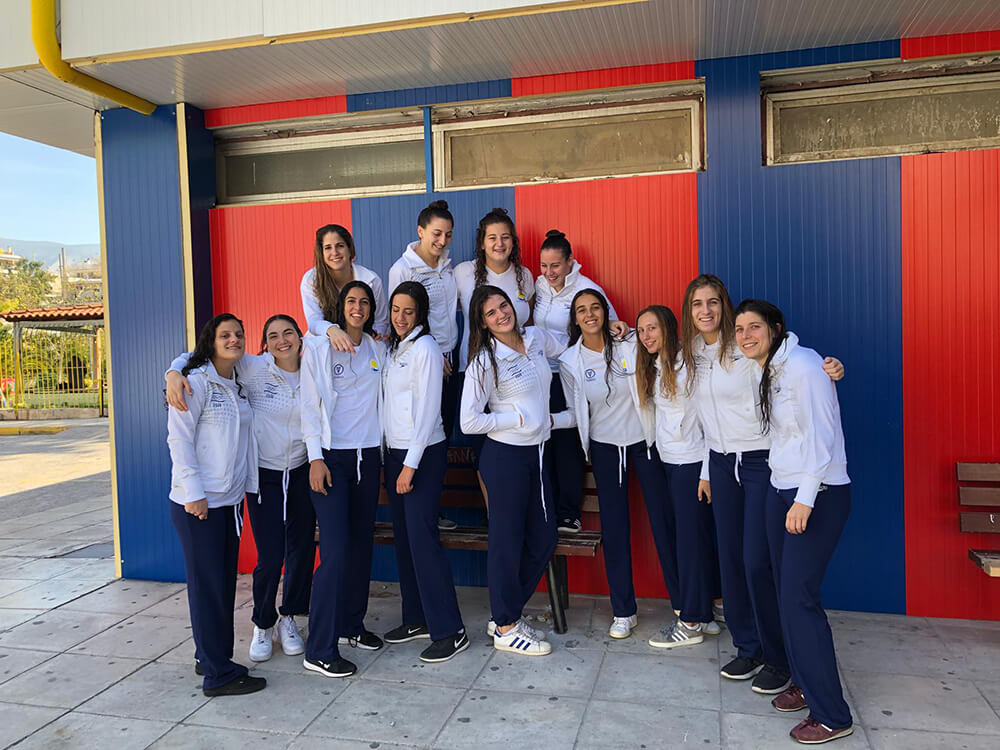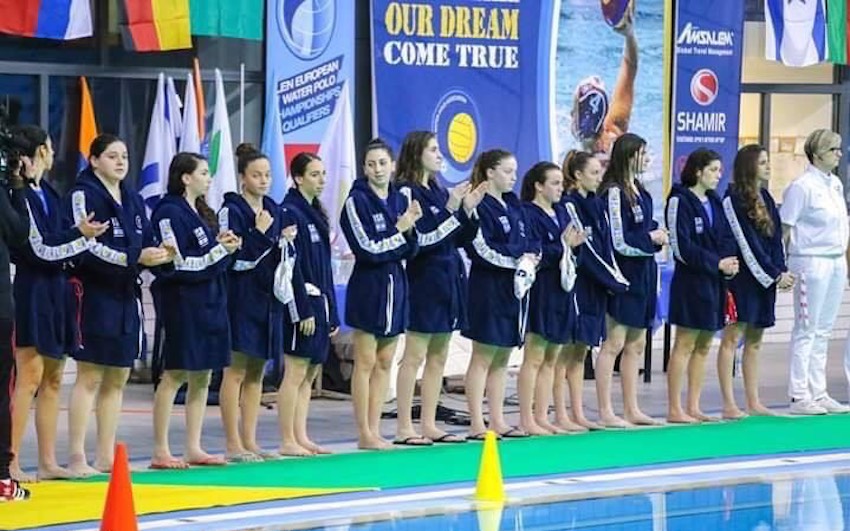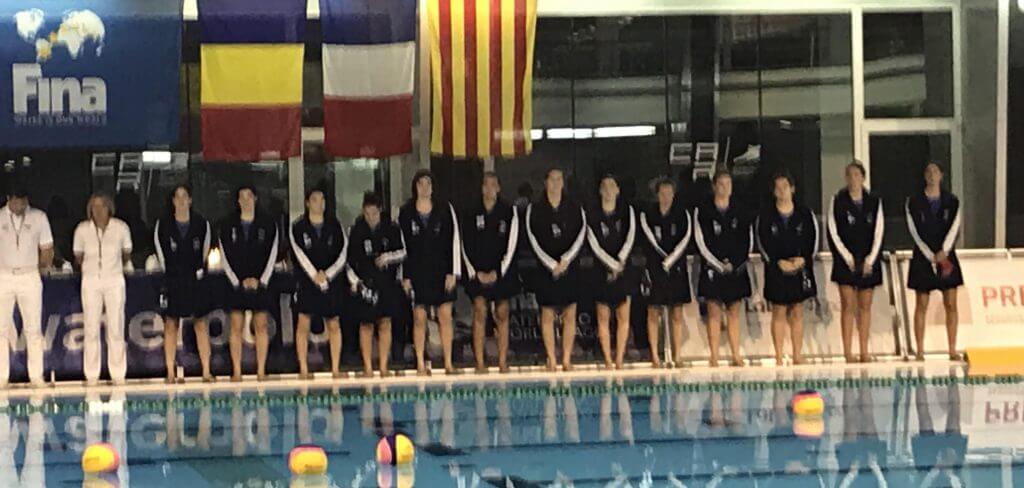Revital Gluska, Israeli Water Polo Association: “You’re not going to hide the Israeli national team”

By Michael Randazzo, Swimming World Contributor
In a story out of Spain combining politics and athletics, earlier this week the Israeli Women’s National Water Polo Team was initially blocked from competing against host Spain in a FINA-sanctioned tournament. Eulàlia Reguant, President Councilor for CUP (Candidacy of Popular Unity)-Capgirem—a leftist political group with influence in the Barcelona municipal government—and the local chapter of BDS (Boycott, Divestment and Sanctions) twice forced Ada Colau, Mayor of Barcelona, to bar the visiting Israelis from competing in her city’s leg of the 2018 Women’s Water Polo World League European Qualification.
[Barcelona Separatists Postpone—But Can’t Prevent—Israel vs. Spain Water Polo Match]
But Revital Cohen Gluska, who for a number of years has been involved with the national team, first as a player, then as a volunteer and for the past two years as president of the country’s water polo association, would have none of this. Gluska demanded that her “girls” be treated fairly. She and other officials battled with Spanish organizers as well as FINA for the right of young Israeli team—with an average age a shade under 21, including seven teenagers—to compete.
And compete they did, with a match finally arranged for Tuesday evening at the CAR Sant Cugat pool, located in a northwestern suburb of Barcelona. In front of a handful of enthusiastic Jewish fans, the Israelis succumbed 11-5 to the host Spaniards. That they did not give in despite exceptional challenges is a testament to Gluska—now a mother of two who played six years at center for the Israeli team.

Given the political and emotional implications whenever Israeli athletes compete on the world stage, there was never a question about CUP’s or BSD’s right to protest. Ultimately it comes down to an issue of timing; this very same Israeli team had competed without incident in Barcelona for two weeks last July, placing tenth (out of 12 teams) at the 2018 European Championships.
Speaking by phone Thursday with Swimming World, Gluska wove a compelling tale of defiance and devotion. The World League is the first international tournament Israeli’s women’s water polo team has ever qualified for and—following an encouraging performance against Greece on Sunday and a moral triumph in Barcelona on Tuesday—Gluska expects that tough lessons learned will resonate with her young charges.
– The Israelis have a young team without much history.
Our first major achievement was this summer [when] we qualified for the European Championships. The senior national team finished 10th [at the European Championships]. We played 19U in Portugal at the [2018 LEN Women’s European U19 Water Polo Championships] and we qualified seventh.
Our captain, Shunit Strugo, is experienced; she’s 32. As a child she started with water polo and was playing with men [growing up]. There were not many women’s teams. After that most of the team is pretty young, with some of the girls as young as 16.
– What motivates your team to compete at such a high level?
These girls come from all around Israel to [the] Wingate Institute, a sports institute. They’re coming from all over many times a week to train. We have a Greek head coach, Dimitrios Mavrotas, and his assistant, Milos Bradic, is from Serbia.
These girls are really enthusiastic to play. Their first game [of the FINA World Cup] was really strong because they played Greece, which finished second in the European Championships; Spain finished third.
We were very anxious to play these two games. The first one they were really shocked to play Greece because they don’t have a lot of experience playing at this level.
– Were you and your team caught off guard by what happened in Barcelona?
When Angel Moliner, representative of the Spanish water polo federation met us in the airport, he was very nice [but] told us there were some political problems. I thought it was a Catalonian/Spain problem. I never dreamt it was something about us.
We had been there the last couple of weeks playing in the European Championship.
They said we might have to change the swimming pool. He also asked me if he could make the game earlier. I said I would speak to the coaches, who said: No problem, we’ll play at 1pm.
He didn’t come and tell me that there was some problem with the BDS so we need to change. That I heard from the Israeli Embassy in Spain and from my security guy.
Already when we were in Greece the Spanish Federation knew there were problems. but they never told us anything about [them].
– Last May the Barcelona City Council called for a comprehensive embargo on Israel, which is why it’s not a total surprise that a boycott could happen.
What I’ve been told is this small city was supposed to host the game; what I found out is in 2013 they [the city of Barcelona] too some regulation about the BDS—this town that was supposed to host us. When they heard that we were coming there, the politicians [who] are controlling this city got a letter from the BDS.
Then they started making problems for the mayor, who decided to cancel the game.
– How did your athletes respond to such a hostile reception in Barcelona?
I was trying to not make them part of the scene. I said: Every one of us has a job to do; yours is to train and play water polo; mine is to do whatever I can to get you the best treatment.
The problem is the Spaniards kept us—and everybody [in the dark]—we didn’t get any information. [My players] all the time asked me: Are we going to play?

Israeli women ready for (polo) battle. Photo Courtesy: Israeli Water Polo Association
And I didn’t have answers. The Spanish team didn’t send any emails, any details; nothing.
Only when they called me to a technical meeting, it was around 11am [Tuesday]. We were on our rooms in the hotel. They asked me: Where are you? So, I said: Why? What is happening?
There’s a technical meeting, [I was told] I said: Sorry. You didn’t tell me anything—when to come, what to do. How do I know there is a technical meeting?
Then, me and my head coach we went to the meeting. FINA was saying: We are sorry! and acting like everything is okay and nothing happened!
I stopped them and said: Listen; this is enough. We’re not going to play this way. You’re not going to hide the Israeli national team! We want to be treated like any other team that comes to play in your country.
I said: I am willing to play in [any] swimming pool that you decide—as long as a crowd can come easily inside to watch the game.
We’ve spent so much time and effort and money on the national team to bring it up to this level. We’re working so hard around this project. I wanted to give the girls and the national team a great sporting experience. I didn’t want them to feel humiliated, that someone is trying to hide them.
It was discrimination, and I couldn’t live with that.
The Hungarian side [of my family] were all killed in the Holocaust—and my husband’s family. I couldn’t live with this feeling. I felt we were discriminated [against] because we are Israeli and Jewish. It was a horrible feeling.
The young girls—most of them around 17 or 18—what have they done wrong to anybody?
– When athletes don the colors of their national team, rightly or wrongly they are associated with all that country is perceived to represent. It must have been known that a negative reaction might be possible.
First of all, I can talk about anything. Israel is a free country and no one will say to me: Don’t talk about this issue.
I never dreamt about making this issue in sport, okay? Just the week before, our Judo team was competing in Dubai, with the Israeli flag and with the Minister of Sport [and Culture] there. We never dreamt this could happen in the middle of Europe—especially because we’d been there for two weeks in July, with an amazing experience.
In the technical meeting the Spanish Federation said: We are going to play around one [p.m.] and that’s it. I said I won’t play without a crowd. They asked me to go see the swimming pool; I said: Thank you but this is a training pool; this is not where we’re going to play.
I went away and they played the game. After 15 minutes they announced they won [by forfeit] because we didn’t appear. I went to my girls and said: Listen, we are not going to play today. Me and the coach explained everything and I told them to go to lunch—you can go to the city and have some fun.
As I’m telling them [this] and sending them to eat lunch, suddenly comes this email from FINA saying that the delegate from Spain [Stefan Botlik] gave them all our complaints and they decided to have another game at 6 p.m.
– When you played on Tuesday you did have a small contingent of Israeli fans at the match.
I said [that] if you want me to play there, now that you and FINA gave us the information, we are only going to play if you let the Jewish community [attend]. The Jewish community contacted me and they really wanted to come and cheer [on] the girls. They told me they were going to bring 200 people.
I then told the Spanish team [that] I was willing to play because this is enough but only if you let the Jewish community come in and cheer. They agreed to let our fans in—so I said we will play.
10 minutes later they came to me and said: Sorry, only 30 people can come in because this is the regulation of the swimming pool.

On the pool deck for the Israeli anthem. Photo Courtesy: Israeli Water Polo Association
After that we went for the official lunch, and everyone is trying to be really friendly and nice but my feelings were bad—really bad.
Then I went to the swimming pool, and the coaches called me [over]. They said: Listen, we don’t know what to do. The girls went to the water and they were crying because they were really mentally crushed
They’re young, so they didn’t know how to raise themselves [up]. I was standing watching the warm-up; it looked bad.
I never speak with them [the players]—I’m trying to do my part [but in the coaching] part I’m never involved. I went to Coach Mavrotas and told him [this is] the only time I’m asking to speak with the girls.
I gathered them and gave them a really Zionist talk; they went to the presentation already in a better mood. We were standing in front of each other, singing the [Israeli] anthem really loud. Then the Spanish anthem starts—suddenly [the Israeli players] saw the crowd coming in with the flags of Israel. Shunit saw them first, and she [pointed the fans out] to the other girls, who started to smile.

Spanish fans of Israeli water polo at CAR Sant Cugat. Photo Courtesy: Jewish Journal (via Twitter)
They put the crowd up in this narrow place [overlooking the pool] and they hung our flags on the walls. Then they started singing to the girls: We Brought Peace Upon You; Hevenu Shalom Aleichem, and the Jewish nation is living, the Jewish people are living, all the time cheering: Israel! Israel!
It made a huge difference. The girls started to play like I never saw them playing. They told me afterwards that they were lifted up [because] all these people came to support them.
That made an amazing feeling for them.
– How will this adversity impact your team as they continue playing?
First of all, I really hope we will never be in this situation again. But I’m not stupid and I’m not naïve. Being Israeli and Jewish, in our own country sometimes we have these conflicts. For the girls, I believe the experience that will only make them stronger, because they will understand that you have to work really hard to be at the level of the first six in Europe.
We’re all sports people and we’re all human beings—each of us has two hands and one head. I hope they will not be intimidated or afraid of high-level [of competition] and that they will believe in themselves.



